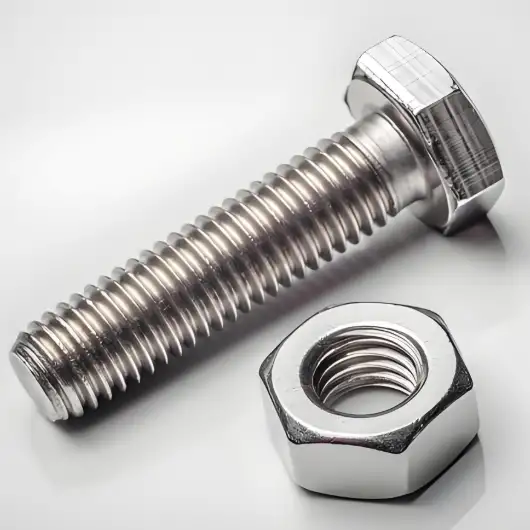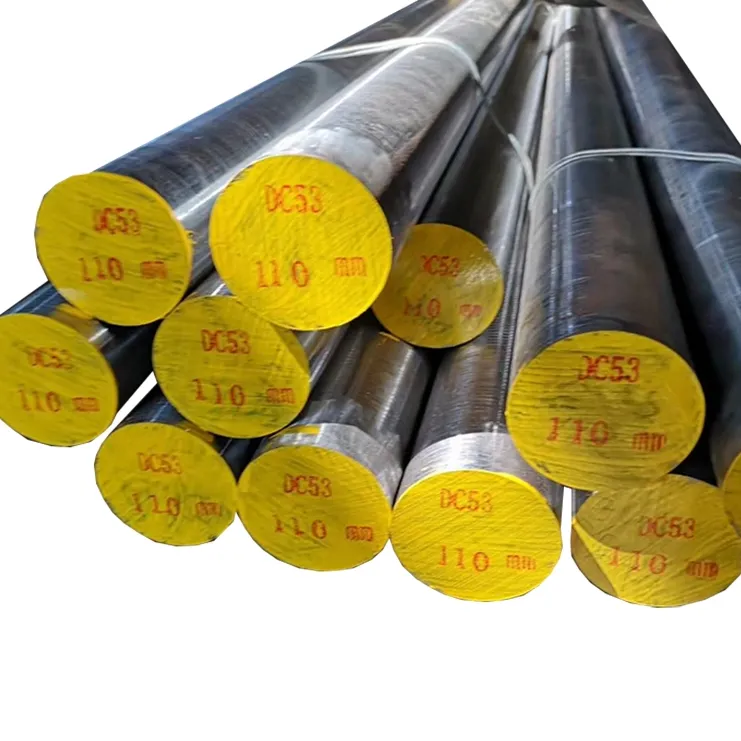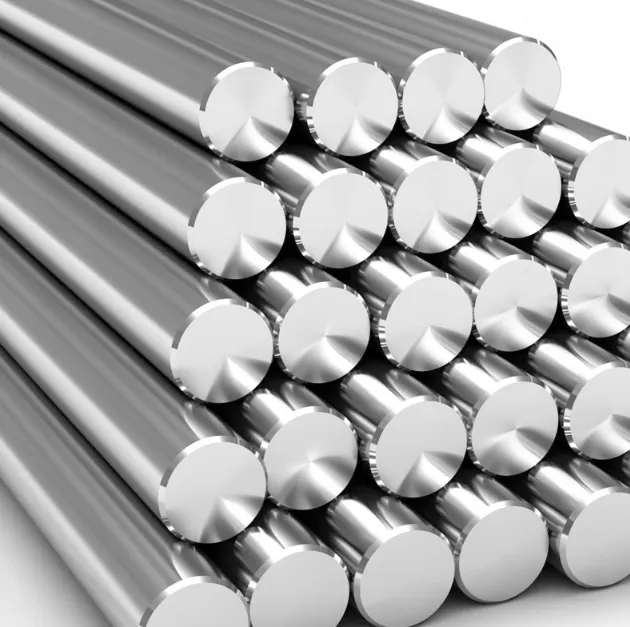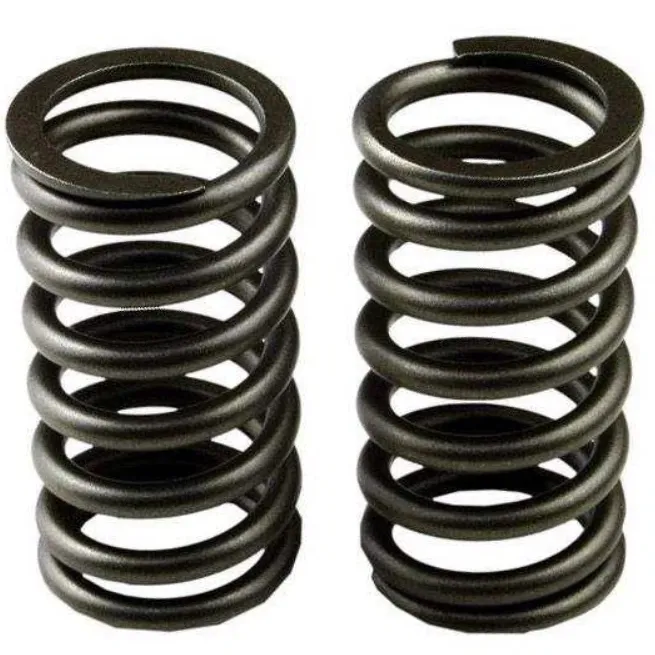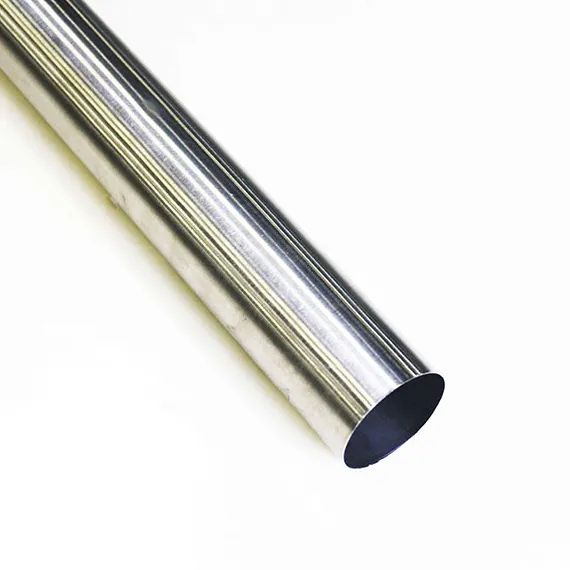Inconel 718 bolts are premium, precipitation-hardenable nickel-chromium-niobium fasteners engineered for sustained high strength, excellent corrosion resistance and dimensional stability from cryogenic temperatures up to roughly 700–800°C. For critical rotating machinery, gas turbines, high-pressure vessels, and extreme chemical environments where failure is not an option, Inconel 718 fasteners are often the optimal choice. MWAlloys supplies certified Inconel 718 bolts from China at factory-direct prices with ready stock for fast delivery to global buyers.
What are Inconel 718 bolts?
Inconel 718 bolts are threaded fasteners manufactured from Alloy 718 (UNS N07718), a nickel-chromium-iron based superalloy that gains high strength from a controlled age-hardening (precipitation) heat treatment. These bolts combine tensile strength, creep resistance and resistance to oxidation and corrosion at elevated temperatures, which makes them suitable for aerospace, power generation, petrochemical, and other severe service environments.
When to use Inconel 718 fasteners
Use Inconel 718 bolts when your design requires:
-
High static and cyclic strength up to ~650–700°C.
-
Stability in environments with corrosive media or oxidizing atmospheres.
-
Good weldability and fabricability compared with other superalloys.
-
Reliable mechanical properties across a wide temperature range (including cryogenic).
If operating temperatures exceed ~700–750°C for prolonged periods, consider alternative alloys optimized for higher creep resistance.
Key material properties
| Property | Typical value / behaviour |
|---|---|
| Density | ~8.19 g/cm³ (0.296 lb/in³) |
| Melting range | ~1260–1336 °C (2300–2437 °F) |
| Max recommended continuous use | Up to ~650–700 °C (application dependent) |
| Tensile strength (aged, typical) | 1200–1600 MPa (varies with condition & temp) |
| Yield strength (aged, typical) | 700–1400 MPa (varies by temp/condition) |
| Hardness (HRC, aged) | ~30–42 HRC (depending on temper) |
| Corrosion resistance | Excellent versus many acids, seawater, and high-temp oxidation |
| Density note | Slight change with aging negligible for most fastener designs |
(Values are representative ranges; final selection should use certified mill test reports and product-specific test data.)
Chemical composition
The following table summarizes the typical allowable composition ranges used for Alloy 718 (UNS N07718). Exact specification limits depend on the governing standard (AMS, ASTM, or manufacturer certification).
| Element | Typical (%) (approximate) |
|---|---|
| Nickel (Ni) | 50.0 – 55.0 |
| Chromium (Cr) | 17.0 – 21.0 |
| Iron (Fe) | Balance (≈ 17 – 21) |
| Niobium + Tantalum (Nb + Ta) | 4.75 – 5.50 |
| Molybdenum (Mo) | 2.8 – 3.3 |
| Titanium (Ti) | 0.65 – 1.15 |
| Aluminum (Al) | 0.20 – 0.80 |
| Carbon (C) | 0.04 – 0.10 |
| Manganese (Mn) | ≤ 0.35 |
| Silicon (Si) | ≤ 0.35 |
| Sulfur (S) | ≤ 0.015 |
| Phosphorus (P) | ≤ 0.015 |
| Copper (Cu) | ≤ 0.10 |
| Boron (B) | trace (≤ 0.006) |
| Cobalt (Co) | ≤ 1.0 |
(Manufacturers may quote slightly different tolerances; the above reflects the widely used commercial ranges for fastener feedstock and bar material.)
Mechanical properties, heat treatment and performance limits
Aging & heat treatment: Alloy 718 is typically supplied in solution-annealed bar condition and is strengthened through a two-step aging or precipitation hardening process that produces γ' and γ'' precipitates (principally Ni₃(Al,Ti) and Ni₃(Nb)), which give the alloy its exceptional yield and tensile properties. Typical heat treatments are defined in aerospace specs (AMS) and vendor documents.
Strength & temperature behavior: In its aged condition, Alloy 718 delivers high yield/tensile strengths at room temperature and retains useful strength to high temperatures; however, long-term creep strength diminishes above approximately 650–700°C. For short-term elevated temperature applications, properties remain favorable to ~700–750°C depending on environment and loading.
Notable mechanical references (typical ranges):
-
Ultimate tensile strength (aged): often 1100–1400 MPa at room temp (application & spec dependent).
-
Yield strength (0.2% offset, aged): commonly 700–1250 MPa.
-
Fatigue and stress-rupture properties are excellent compared with many stainless steels but must be selected with certified test curves for critical components.
Always request mill certificates and, for safety-critical uses, independent mechanical testing to validate the exact property curves at service temperature.
Standards, specifications and test methods
Inconel 718 material and fasteners are produced and certified to several international specifications. Key references commonly used by fastener manufacturers and purchasers include:
-
ASTM/ASME B637 — Bar, forging and fastener stock for nickel and nickel alloys (applies to alloy 718 feedstock for fastener manufacture).
-
AMS specifications such as AMS 5662 / AMS 5663 / AMS 5596 — aerospace material specifications for bar and forgings used in critical fasteners; these define heat treatment, chemistry and mechanical requirements.
-
ISO, DIN, JIS and national fastener standards for dimensional and thread forms (e.g., ISO 4014/4017 for hex bolts, DIN 933/931, ASME B18 series for nuts/bolts).
Purchasers should specify both the material standard (UNS N07718 / AMS/ASTM) and the fastener standard (dimensional & mechanical class) when ordering.
Equivalent grades and cross-references
| Common name / system | Equivalent designation |
|---|---|
| UNS | N07718 |
| Werkstoff / WNr. (Germany) | 2.4668 |
| Trade names | Inconel 718, Alloy 718, Nickel 718 |
| ISO / JIS | Often referenced as NCF718 or equivalent local codes |
| Notes | For some applications, other nickel alloys (e.g., 625) are considered, but they are not direct equivalents in strength or age-hardening behavior. |
Cross references and equivalences can vary by region and by supplier; always use UNS N07718 and the specific AMS/ASTM spec when precise interchangeability is required.
Sizes and weight reference
Below is a compact reference table showing approximate weights for common hex bolt sizes in Inconel 718. Use certified fastener weight tables for packing, lifting and engineering calculations.
| Bolt size | Length (example) | Approx. weight per 100 pcs (kg) — hex bolt (approx.) |
|---|---|---|
| M8 × 20 | 20 mm | ~3.0 kg |
| M10 × 25 | 25 mm | ~5.5 kg |
| M12 × 30 | 30 mm | ~9.5 kg |
| M16 × 40 | 40 mm | ~20 kg |
| M20 × 60 | 60 mm | ~40 kg |
| 1/2" × 2" | 2" | ~25–30 kg per 100 pcs (imperial example) |
Notes:
-
These are illustrative approximations; exact weights depend on bolt head style, thread percentage, and length. For precise mass budgeting use vendor-supplied CAD data or weight charts. Fastener suppliers publish detailed weight tables for each bolt series.
Manufacturing, cold forming and machining notes
-
Forming: Inconel 718 can be cold-headed for many fastener shapes in the solution-annealed condition, but tooling wear is higher than for steels. Controlled lubrication and die maintenance are critical.
-
Machining: Machine with rigid setups, carbide tooling and conservative cutting parameters; expect lower machinability compared with austenitic stainless steels. Preheating is not required for common operations, but segmented or heavy cuts should be planned with thermal control.
-
Heat treatment: Final precipitation aging must be performed to obtain the required mechanical properties; some fasteners are supplied in aged condition from the mill, others are aged after forming. Always confirm heat-treatment condition with MTRs.
Corrosion resistance and high-temperature performance
Alloy 718 offers strong resistance to general corrosion, pitting and crevice attack in many chloride environments, as well as excellent resistance to oxidation at elevated temperatures. It is also commonly used in sour-service applications when appropriately qualified. However, corrosion performance depends on microstructure, heat treatment, and environmental factors — lab testing or field experience should guide final selection.
Typical applications
-
Gas and steam turbine components (cases, disks, bolts in hot sections).
-
Aerospace structural and engine fasteners where high strength and thermal stability are required.
-
Petrochemical and oil & gas equipment exposed to corrosive fluids and elevated temperature.
-
Cryogenic tanks and vessels where alloy 718 retains ductility.
-
Nuclear industry and high-pressure valves.
Global price comparison 2025
Important: commodity metal prices fluctuate daily with market demand, certification, quantity and form (bar, rod, fastener). The table below is a 2025 market snapshot range intended for budgeting only. Request live quotes for order decisions.
| Region | Typical range (per kg) — 2025 indicative | Notes |
|---|---|---|
| USA / North America | $30 – $90 / kg (≈ $14–$41 / lb) | Aerospace-certified lots at high end; standard industrial bar lower. |
| Europe | $35 – $95 / kg | VAT, certification and logistics affect landed cost. |
| China (domestic mills / factory-direct) | $24 – $60 / kg | Large volume orders and domestic mills can offer lower landed ranges; factory-direct fastener supply from MWAlloys often sits in the competitive lower-mid band for industrial grades. |
Why ranges are wide: certification (AMS/ASTM), product form (bar vs finished fastener), lot size, lead time, traceability and freight all influence the end price. For tightly specified aerospace fasteners, expect premiums and additional inspection/test costs.
Purchasing, certification and MWAlloys offering
As a global supplier, MWAlloys provides:
-
Certified Inconel 718 bolts manufactured in China with full mill test reports (MTRs) and the option for third-party inspection.
-
Factory-direct pricing (100% factory price advantage) for standard and custom sizes.
-
Stock items available for rapid dispatch, and expedited production for larger or certified batches.
-
Options for AMS/ASTM certification, heat treatment records, hardness and tensile test reports, and non-destructive test (NDT) per buyer requirement.
Why buy from a factory supplier like MWAlloys: sourcing direct from a reputable Chinese mill reduces middle-margin cost, enables easier bespoke customization (lengths, head types, plating) and often shortens lead times when stock is held locally. For safety-critical or certified aerospace items, buyers should request specific AMS certifications and independent testing.
Installation, torqueing and inspection tips
-
Use torque values derived from the specific fastener diameter, thread condition and lubrication. Inconel 718’s strength allows high clamp loads, but thread galling under high friction must be managed with appropriate lubrication or coatings.
-
For critical joints: use calibrated torque wrenches, control friction, and validate preload with direct measurement where possible.
-
Inspect bolts for embrittlement, corrosion, or hydrogen-induced cracking when used in aggressive environments; request traceability to batch heat treat records for suspicious failures.
Comparison with alternate nickel alloys
-
Inconel 625: better weldability and corrosion resistance in many environments, but lower yield strength than 718; choose 625 where strength to ~600°C is sufficient and weldability is prioritized.
-
Inconel 600 / 601: used for general high-temperature corrosion resistance but not as strong as 718 at elevated temperatures.
-
Hastelloy / Alloy X: used where specific corrosion types demand nickel-molybdenum based chemistries — not direct substitutes for 718 in strength-critical applications.
FAQs
Inconel 718 Bolts: Aerospace & High-Strength FAQ
1. What is the UNS number for Inconel 718?
2. Can Inconel 718 bolts be used above 700 degrees C?
While Inconel 718 is a high-temperature alloy, its peak mechanical stability is up to 650-700 degrees C. Above this range, the gamma-double-prime ($\gamma''$) strengthening phase begins to over-age, leading to a decline in long-term creep strength. For service above 700 degrees C, consider Inconel 751 or Waspaloy.
3. Are Inconel 718 bolts corrosion resistant in seawater?
4. What standards cover Alloy 718 fastener stock?
5. How should Inconel 718 bolts be tightened?
Always use calibrated torque wrenches and specialized high-temperature lubricants or silver plating to achieve target preload. For critical turbine or pressure vessel joints, direct tension measurement is preferred over torque alone.
6. Is Inconel 718 weldable?
7. How do Inconel 718 and 625 differ for bolts?
The main difference is Strength. Inconel 718 is precipitation-hardenable and can reach nearly double the yield strength of Inconel 625. Choose 718 for high-load fasteners; choose 625 for applications requiring maximum aqueous corrosion resistance and higher ductility.
8. What documentation should come with certified bolts?
- Mill Test Report (MTR): Confirming chemical composition.
- Heat Treatment Records: Detail on the aging cycles.
- Mechanical Test Reports: Hardness and tensile test results.
- NDT Reports: Such as Dye Penetrant or Magnetic Particle (if specified).
9. Can these bolts be passivated or plated?
10. How to source fastener samples and small lots quickly?
MWAlloys maintains an inventory of common Inconel 718 bolt sizes and fastener stock. We can ship small quantities for prototyping and evaluation, all accompanied by full MTR documentation to ensure your project stays on schedule.

